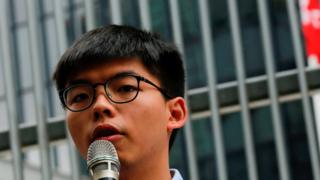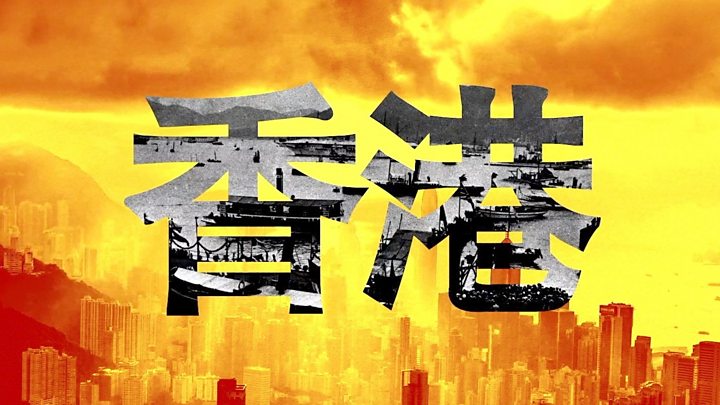
Reuters
Joshua Wong said the decision showed a “total disregard for the will of Hongkongers”
Hong Kong authorities have disqualified 12 pro-democracy candidates from upcoming elections, deepening political tensions in the Chinese territory.
Opposition legislators had hoped to obtain a majority in the Legislative Council (LegCo) in September’s poll after Beijing’s imposition of a highly controversial national security law.
Among those barred are high-profile activists Joshua Wong and Lester Shum.
The government said the candidates were not fit to run for office.
It said they could not be considered to be abiding by the constitutional duty required of lawmakers if they:
- advocated for, or promoted, Hong Kong’s independence
- solicited intervention by foreign governments in Hong Kong’s affairs
- expressed “an objection in principle” to the imposition of the national security law by central authorities in Beijing
- expressed “an intention to exercise the functions of a LegCo Member by indiscriminately voting down” any legislative proposals introduced by the Hong Kong government, “so as to force the government to accede to certain political demands”
In its statement announcing the disqualifications, the government said the decision was taken in line with Hong Kong’s mini-constitution – the Basic Law.
“There is no question of any political censorship, restriction of the freedom of speech or deprivation of the right to stand for elections as alleged by some members of the community,” it said, adding that more disqualifications could not be ruled out.
Joshua Wong, who rose to prominence as a teenage activist during protests in 2014, said the decision showed “a total disregard for the will of Hongkongers” and “tramples upon the city’s last pillar of vanishing autonomy”.
The new national security law has been highly controversial in Hong Kong, a former British colony which is now part of China but was given unique freedoms in an agreement before the transfer of sovereignty.
The law was widely condemned by Western governments, but China says it is necessary to restore stability in the territory, which was hit by months of pro-democracy protests last year which often turned violent.
The opposition candidates disqualified on Thursday include four incumbent lawmakers, four district councillors – including Mr Shum – and activists Ventus Lau Wing-hong, Gwyneth Ho Kwai-Lam and Alvin Cheng Kam-mun, in addition to Mr Wong.
The Civic Party, one of the city’s pro-democracy parties who counted members among those barred, said the disqualifications “exploited the right of Hong Kong people to vote”, Reuters news agency reports.
Its four disqualified members were Alvin Yeung, Dennis Kwok, Kwok Ka-ki and Cheng Tat-hung.

Media playback is unsupported on your device
The disqualification of candidates comes amid speculation that the government could postpone the election as a result of a resurgence of coronavirus.
On Wednesday, Hong Kong’s Chief Executive Carrie Lam said it was on the verge of a “large-scale outbreak”, which could cause hospitals to “collapse”.
Table Of Contents
A widely anticipated move
By Grace Tsoi, BBC World Service, Hong Kong
The mass disqualification of pro-democracy candidates has been widely anticipated after the first precedents in 2016. This came as a heavy blow after the pro-democracy camp held the primaries, in which more than 600,000 voted, just a little more than two weeks ago.
Many of the barred candidates are young and support more confrontational tactics to fight for their cause. But it came as a surprise that four candidates from the Civic Party, which was founded by a group of lawyers in 2006, were also banned from running. It has been considered a more moderate wing of the democratic movement.
There have been speculations that the government is planning to postpone the Legislative Council election by one year amid a new outbreak of coronavirus. Critics say the government wants to delay the election because the pro-Beijing camp will face a stunning defeat like last year’s District Council elections.
On the other hand, the government says candidates cannot perform the duties of lawmakers if they vote down any proposals and force the government to meet political demands after securing a majority. Then the next question is, will any opposition candidates be allowed to run in the future?
What is LegCo?
The Legislative Council helps to make and amend Hong Kong’s laws.
It is made up of 70 seats – but only 35 of these seats are directly voted for by the public.
Image copyright
Getty Images
File photo of the chamber of the Legislative Council
Another 30 seats represent “functional constituencies” – these are voted for by smaller groups representing special interests, primarily businesses, banking and trade. Historically these sectors have been largely pro-Beijing.
The last five seats are made up of district councillors who are elected by the public to sit on LegCo.
This system, where only a proportion of LegCo councillors are chosen by the public, has been called undemocratic by critics, but supporters of the system say it helps avoid populism and protects Hong Kong’s business interests.